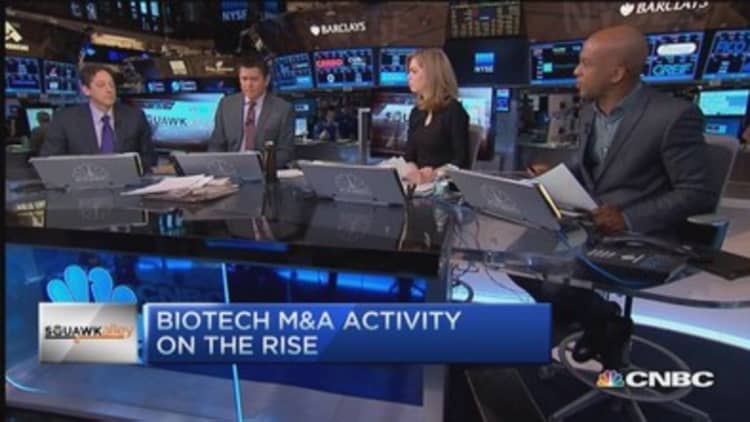The Nasdaq composite closed above 5,000 just two times in March of 2000. At the risk of uttering the four most terrifying words for investors, analysts say, "It's different this time." This Nasdaq 5,000 has legs.
"The fact that it hasn't been at that level in 15 years means that it should offer some resistance," said Mark Newton, chief technical analyst at Greywolf Execution Partners. But beyond psychological resistance, he explained, "I don't see any issue with the 5,000 level."
Read More Trading tech and biotech: 8 plays on 2 hot sectors
"It was euphoria that took you there back then," argued Brian Klatsky, sector head of Nasdaq trading at Knight Capital Group, now known as KCG. This time, the 17-year trading veteran hasn't seen retail investors become enthralled with the tech sector—except for biotech.
"You do see doctors and wealthy retail investors who think they have a little edge on the science," he observed. "The money comes in to chase what could be the next-best science, rather than the next-best business models."
More biotech in Nasdaq 5000
The Nasdaq composite remains heavily weighted toward technology, thanks to Apple's record market valuation near $750 billion. But tech's weighting is down sharply from the Nasdaq's peak, while the financial, consumer services and health-care sectors have seen their weightings more than double within the composite. [See table below.]
Health care's weighting in the composite is now 16 percent, which is comparable to the sector's weighting within the S&P 500, but on the Nasdaq it is overwhelmingly dominated by biotech.
The Nasdaq biotech sector has more than doubled since its March 2000 peak, consistently notching historic highs. Year to date, the Nasdaq iShares Biotechnology ETF is up 12 percent, gaining more than double in percentage terms than the Nasdaq 100 ETF, the Powershares QQQ trust.
The outperformance has attracted more interest from both retail and professional investors.
Read More Receptos CEO: Building for the long term
In 2014, about 50 tech-focused mutual funds tracked by Morningstar saw net inflows of just more than $1 billion. Meanwhile, net inflows to a half dozen biotech mutual funds topped $1.4 billion last year, according to the independent investment research firm.
Investors have also been keen to scoop up biotech IPOs at record levels. About a third of all initial public offerings in 2014 were biotechs, according to Renaissance Capital. Nearly half of them were still in early stage preclinical trials, and a quarter were focused on oncology.
"They can't all cure cancer," said Renaissance research analyst Matt Kennedy, who sees a bit too much exuberance in the sector. "History may not repeat itself with another dot-com bubble, but the fervor over biotech IPOs sounds familiar."
Is biotech the new dot-com?
KCG's Klatsky doesn't buy the comparison to the dot-com bust, when it comes to biotechs.
"You are looking at some interesting medicines," he said, adding, "There have been a lot of recent success stories."
Gilead, the largest biotech on the Nasdaq with a market cap of $153.3 billion, saw a blockbuster launch of its breakthrough hepatitis C drug in 2014, which sent the stock to record highs last year.

After strong gains for the major biotech indexes, this may not be the best entry point for new investors, said Greywolf's Newton, the technical analyst. Given how much the stocks have appreciated, his analysis suggests there will be another pullback in the sector over the next few months.
"As you hit the spring, you will probably see a rotation back into pharma stocks," Newton said, but he doesn't think it will be long term.
Biotechs saw a steep pullback last April and again in October, before ending the year at new record highs.
"I'm still positive on the group," Newton said. "It's difficult to be negative."
Nasdaq Composite Then & Now: Industry Weighting
| Industry | March 2000 | February 2015 |
| Weighting % | Weighting % | |
| Telecom | 11.8 | 0.8 |
| Utilities | 0.1 | 0.1 |
| Oil & gas | 0.3 | 0.9 |
| Basic materials | 0.2 | 0.8 |
| Industrials | 3.7 | 5.5 |
| Consumer goods | 1.3 | 4.7 |
| Consumer services | 7.7 | 20.8 |
| Health care | 6.8 | 16.1 |
| Financials | 3.3 | 7 |
| Technology | 64.9 | 43.3 |
Source: Source: Nasdaq


